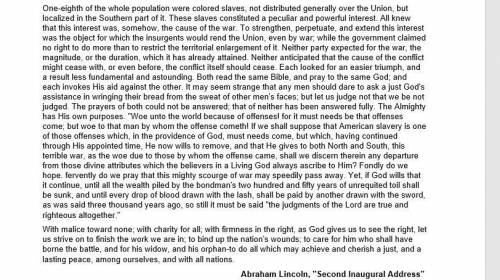1. In this address, Lincoln is addressing:
(a) America on the brink of the Civil War.
(b) Ame...

English, 27.02.2021 14:00 queentynaisa
1. In this address, Lincoln is addressing:
(a) America on the brink of the Civil War.
(b) America at the end of the Civil War.
(c) An America far enough into the war to have felt its toll.
(d) the Confederates.
(e) the slaves.
2. Lincoln attempts to persuade his audience that:
(a) the war should continue until the Confederacy surrenders.
(b) the war must end now.
(c) the slaves should be set free.
(d) the war has benefited the economy.
(e) the Confederates are on the verge of surrender.
3. Lincoln establishes his ethos by:
(a) taking responsibility for the war.
(b) quoting from famous philosophers.
(c) arousing his audience’s anger.
(d) portraying himself as a humble servant of God’s will.
(e) criticizing slaveholders.
4. "It may seem strange, that any man would dare ask God’s assistance in wringing their bread from the sweat of other men’s faces" is an example of:
(a) ethos.
(b) pathos.
(c) logos.
(d) ad hoc fallacy.
(e) argument.
5. In the speech as a whole, Lincoln attacks slavery:
(a) not at all.
(b) but indicates that God, not he, is the proper judge of slavery.
(c) fiercely.
(d) only while condemning slaves as well as slavery.
(e) while mentioning the virtues of Confederate supporters.
6. Lincoln argues that the sufferings of the South are:
(a) tragic, and ought to be ended.
(b) greater than the sufferings of the North.
(c) the result of God’s justice.
(d) less than the suffering of their slaves.
(e) at an end.
7. In general, Lincoln uses diction and cadences similar to:
(a) a legal contract.
(b) a political debate.
(c) a drama.
(d) an elegy.
(e) the Bible.
8. The state of mind Lincoln attempts to create in his audience is one of:
(a) horror about the tragedies of war.
(b) anger toward the Confederates.
(c) a renewed belief in the war’s cause, and inspiration to press on until the end.
(d) a solemn reminiscence about the deaths caused by the war.
(e) a desire to end the war.


Answers: 1
Another question on English

English, 21.06.2019 22:30
Fine fellow, that lebrun," said arobin when robert had gone. "i never heard you speak of him.""i knew him last summer at grand isle," she replied. what becomes apparent during this conversation? robert and arobin are both aware they are rivals for edna’s affections.arobin is unaware of robert’s role in edna’s life, but robert is aware of arobin’s role.robert is completely unaware of arobin’s romantic intentions and love for edna.robert has much more confidence in himself than arobin does.
Answers: 2

English, 21.06.2019 23:30
Me ! select the correct answer. in his essay "civil disobedience," henry david thoreau wrote "that government is best which governs least." which answer best shows how this motto reflects transcendentalist principles? a. an ideal government does not exist, so anarchy is best for a nation. b. citizens require the government to define the difference between right and wrong. c. government can act as an impediment to the will and morality of individual men. d. an ideal nation is one that is not governed by a monarchy or dictatorship. e. government on a large scale is inefficient and should be managed at the state level.
Answers: 1

English, 22.06.2019 01:00
Read the excerpt from act 1 of a doll's house. helmer: nora! [goes up to her and takes her playfully by the ear.] the same little featherhead! suppose, now, that i borrowed fifty pounds today, and you spent it all in the christmas week, and then on new year's eve a slate fell on my head and killed me, and— nora: [putting her hands over his mouth]. oh! don't say such horrid things. helmer: still, suppose that happened, —what then? nora: if that were to happen, i don't suppose i should care whether i owed money or not. helmer: yes, but what about the people who had lent it? nora: they? who would bother about them? i should not know who they were. helmer: that is like a woman! but seriously, nora, you know what i think about that. no debt, no borrowing. there can be no freedom or beauty about a home life that depends on borrowing and debt. we two have kept bravely on the straight road so far, and we will go on the same way for the short time longer that there need be any struggle. nora: [moving towards the stove]. as you , torvald. how does the interaction between helmer and nora advance the plot? nora realizes that helmer will completely disapprove of her having borrowed money, so she has to continue to keep it a secret from him. nora realizes that she and helmer have the same ideas about financial issues, and the conversation brings them closer together later in the play. helmer realizes that nora is more responsible with money than he originally thought, and he trusts her more with finances later in the play. nora realizes that helmer knows a lot more about borrowing and lending, and she will seek his input later when she needs it.
Answers: 1

English, 22.06.2019 01:30
Odysseus taunts the cyclops and reveals his name, endangering the lives of his men. what does this evidence from the text reveal about odysseus?
Answers: 3
You know the right answer?
Questions

Mathematics, 10.11.2020 09:40






Physics, 10.11.2020 09:40




Computers and Technology, 10.11.2020 09:40

Chemistry, 10.11.2020 09:40

Mathematics, 10.11.2020 09:40

Mathematics, 10.11.2020 09:40

Mathematics, 10.11.2020 09:40




Biology, 10.11.2020 09:40



